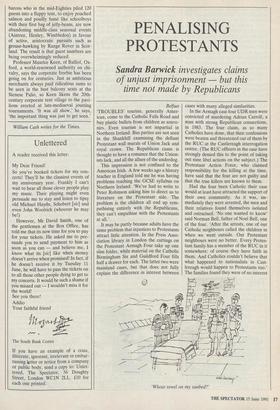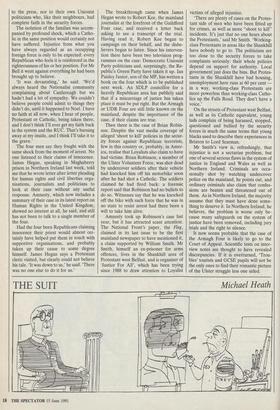PENALISING PROTESTANTS
Sandra Barwick investigates claims
of unjust imprisonment — but this time not made by Republicans
Belfast 'TROUBLES' tourists, generally Amer- ican, come to the Catholic Falls Road and buy plastic bullets from children as souve- nirs. Even tourism is not impartial in Northern Ireland. Bus parties are not seen in the Shankhill examining the defiant Protestant wall murals of Union Jack and royal crown. The Republican cause is thought to have a romance that the Union- ists lack, and all the allure of the underdog.
This impression is not confined to the American Irish. A few weeks ago a history teacher in England told me he was having problems teaching the GCSE syllabus on Northern Ireland: 'We've had to write to Peter Robinson asking him to direct us to literature on the Protestant side. The problem is the children all end up sym- pathising entirely with the Republicans, they can't empathise with the Protestants at all.'
It may be partly because adults have the same problem that injustices to Protestants attract little attention. In the Press Asso- ciation library in London the cuttings on the Protestant Armagh Four take up one slim folder, while material on the Catholic Birmingham Six and Guildford Four fills half a drawer for each. The latter two were mainland cases, but that does not fully explain the difference in interest between cases with many alleged similarities.
In the Armagh case four UDR men were convicted of murdering Adrian Carroll, a man with strong Republican connections, in 1983. The four claim, as so many Catholics have done, that their confessions were beaten and threatened out of them by the RUC at the Castlereagh interrogation centre. (The RUC officers in the case have strongly denied this to the point of taking out nine libel actions on the subject.) The Protestant Action Force, who claimed responsibility for the killing at the time, have said that the four are not guilty and that the true killers are known to them.
Had the four been Catholic their case would at least have attracted the support of their own community. As it was, im- mediately they were arrested, the men and their relatives found themselves isolated and ostracised. 'No one wanted to know' said Norman Bell, father of Noel Bell, one of the four. 'After the arrests, one of our Catholic neighbours called the children in when we went outside. Our Protestant neighbours were no better. Every Protes- tant family has a member of the RUC in it somewhere: of course they have faith in them. And Catholics couldn't believe that what happened to nationalists in Cast- lereagh would happen to Protestants too.' The families found they were of no interest 'Whose towel on my sunbed?' to the press, nor to their own Unionist politicians who, like their neighbours, had complete faith in the security forces.
The isolation of the families was accom- panied by profound shock, which a Catho- lic in the same position would certainly not have suffered. Injustice from what you have always regarded as an occupying foreign force is only to be expected: every Republican who feels it is reinforced in the righteousness of his or her position. For Mr Bell it went against everything he had been brought up to believe.
'It was devastating,' he said. 'We'd always heard the Nationalist community complaining about Castlereagh but we hadn't had a lot of sympathy. We couldn't believe people could admit to things they didn't do, until it happened to Noel. I have no faith at all now, when I hear of people, Protestant or Catholic, being taken there, and I don't think I'll ever get my faith back in the system and the RUC. That's burning away at my inside, and I think I'll take it to the grave.'
The four men say they fought with the same shock from the moment of arrest. No one listened to their claims of innocence. James Hegan, speaking in Maghaberry prison in Northern Ireland last week, told me that he wrote letter after letter pleading for human rights and civil liberties orga- nisations, journalists and politicians to look at their case without any useful response. Amnesty, which now includes a summary of their case in its latest report on Human Rights in the United Kingdom, showed no interest at all, he said, and still has not been to talk to a single member of the four.
Had the four been Republicans claiming innocence their priest would almost cer- tainly have helped put them in touch with supportive organisations, and probably taken up their cause to some degree himself. James Hegan says a Protestant cleric visited, but clearly could not believe his tale. 'It was down to us,' he said. 'There was no one else to do it for us.' The breakthrough came when James Hegan wrote to Robert Kee, the mainland journalist at the forefront of the Guildford Four case, and received a letter back asking to see a transcript of the trial. Having read it, Robert Kee began to campaign on their behalf, and the disbe- lievers began to listen. Since his interven- tion there have been two television prog- rammes on the case: Democratic Unionist Party politicians and, surprisingly, the Re- public's Green Party have taken it up. Ian Paisley Junior, son of the MP, has written a book on the four which is to be published next week. An SDLP councillor for a heavily Republican area has publicly said that if a miscarriage of justice has taken place it must be put right. But the Armagh or UDR Four are still little known on the mainland, despite the importance of the case, if their claims are true.
Then there is the case of Brian Robin- son. Despite the vast media coverage of alleged 'shoot to kill' policies in the secur- ity forces against Republican terrorists, few in this country or, probably, in Amer- ica, realise that Loyalists also claim to have had victims. Brian Robinson, a member of the Ulster Volunteer Force, was shot dead by undercover soldiers after their vehicle had knocked him off his motorbike soon after he had shot a Catholic. The soldiers claimed he had fired back: a forensic report said that Robinson had no bullets to do so. Witnesses say that he was knocked off the bike with such force that he was in no state to resist arrest had there been a will to take him alive.
Amnesty took up Robinson's case last year, but it has attracted scant attention. The National Front's paper, the Flag, claimed in its last issue to be the first mainland newspaper to have mentioned it, a claim supported by William Smith. Mr Smith, himself an ex-prisoner for arms offences, lives in the Shankhill area of Protestant west Belfast, and is organiser of 'Justice For All', which has been trying since 1988 to draw attention to Loyalist victims of alleged injustice.
'There are plenty of cases on the Protes- tant side of men who have been fitted up for crimes, as well as more "shoot to kill" incidents. It's just that no one hears about the Protestants,' said Mr Smith. 'Working- class Protestants in areas like the Shankhill have nobody to go to. The politicians are too close to the security forces to take complaints seriously: their whole policies depend on support for authority. Local government just does the bins. But Protes- tants in the Shankhill have bad housing, unemployment here runs at 60 per cent — in a way, working-class Protestants are more powerless than working-class Catho- lics up the Falls Road. They don't have a voice.'
On the streets of Protestant west Belfast, as well as its Catholic equivalent, young lads complain of being harassed, stopped, questioned and bullied by the security forces in much the same terms that young blacks used to describe their experiences in Brixton to Lord Scarman.
Mr Smith's view is, refreshingly, that injustice is not a sectarian problem, but one of several serious flaws in the system of justice in England and Wales as well as Northern Ireland. Criminals are occa- sionally shot by watching undercover police on the mainland, he points out, and ordinary criminals also claim that confes- sions are beaten and threatened out of them. As in Northern Ireland, the majority assume that they must have done some- thing to deserve it. In Northern Ireland, he believes, the problem is worse only be- cause many safeguards on the system of justice have been removed, including jury trials and the right to silence.
It now seems probable that the case of the Armagh Four is likely to go to the Court of Appeal. Scientific tests on inter- view notes are thought to have revealed discrepancies. If it is overturned, 'Trou- bles' tourists and GCSE pupils will not be the only ones to find their romantic picture of the Ulster struggle less one sided.



















































 Previous page
Previous page